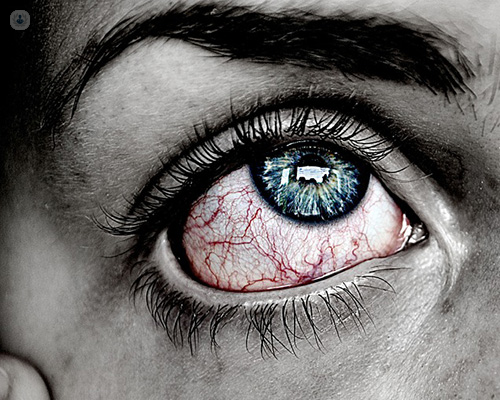What do eye floaters look like?
Autore:If your vision is frequently spoiled by lines, spots and shadows, it may be time for a trip to the eye specialist to check for floaters. Expert ophthalmologist and vitreoretinal surgeon Mr Chien Wong explains what floaters look like and whether they can cause blindness…

What are eye floaters?
Floaters are tiny pieces of debris that float in the vitreous gel and retina of the eye. They have been described as looking like black dots, cobwebs or floating black lines, disrupting vision. Eye floaters are common symptoms of underlying conditions that affect the vitreous gel and retina of the eye. The retina is a bit like the film at the back of an old-fashioned camera as it captures images from the outside world and sends them back to the brain. The vitreous gel sits just in front of the retina and together they occupy more than 60% of the volume of the eyeball.
What causes eye floaters?
Floaters are most commonly caused by the ageing of the vitreous gel. As the gel ages, it becomes more liquefied with clumps of condensed gel that appear as floaters in the vision. Adults can spot eye floaters in their vision by looking up at a clear blue sky, although this is not too worrying. Occasionally, floaters may be more noticeable and can interfere with everyday activities such as reading and watching a computer or TV screen. In people with diabetes, floaters may be due to bleeding from the retina into the vitreous gel because of advanced retinal disease.
Can floaters cause blindness?
Floaters tend to be harmless but if there is a sudden change or an increase in number, it is important to have a check-up with a specialist. This is to determine whether there is a retinal tear or retinal detachment, which can rapidly lead to blindness if left untreated. At birth, the vitreous gel is attached to the retina. As we age, the vitreous gel causes it to separate from the retina in the majority of people by the age of 70. When that happens, on some occasions, a retinal tear or retinal detachment could develop suddenly.
What other problems can ageing vitreous gel cause?
Ageing vitreous gel can also lead to problems with the central retina itself (the macula), such as the macular hole, epiretinal membrane and vitreomacular traction. Symptoms include distortion and blurring of vision, which is why visiting an ophthalmologist for an eye check-up is important.
How are eye floaters treated?
Floaters can be cured with vitrectomy surgery. Treatment for central vision problems includes vitrectomy and highly delicate retinal surgery.


